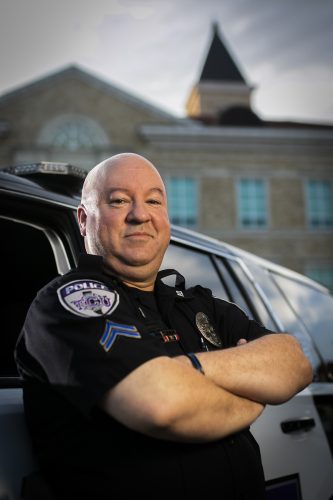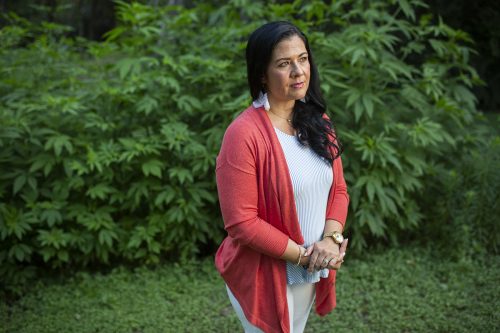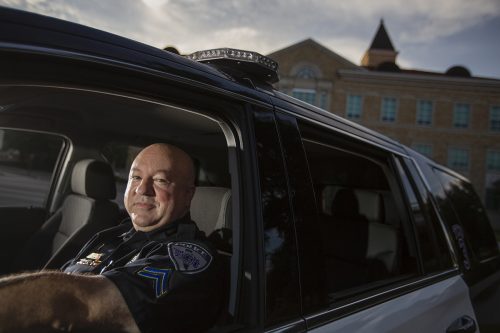
Photos by Getty Images © amphotora, digihelion, RROCIO, ToddSm66, Maltaguy1, fcafotodigital, Pakorn Kumruen / EyeEm, MILEA
Master of Liberal Arts Program Encourages Critical Thinking
The degree gives graduate students a chance to take lifelong learning and leading a step beyond.
A psychiatric patient doused himself with gasoline and raised a lighter. John Thornhill, then a staff police officer at John Peter Smith Health Network in Fort Worth, watched from 15 feet away. “The lighter would come on and go out, come on and go out,” he recalled.
Thornhill, a U.S. Air Force veteran, knew to rely on communication and empathy to prevent one man’s bad day from becoming a mass-casualty event. He needed “to make eye contact, [not] stare, talk in a normal tone of voice, try and get a name, introduce myself.”
The police officer’s communication skills turned into survival skills, and everyone made it through that dangerous night unscathed. Years later, Thornhill, now a corporal and firearms instructor for TCU Police, wrote about the encounter for a class in the university’s Master of Liberal Arts program.
The 30-hour graduate program has relaxed admission requirements — a bachelor’s degree from an accredited four-year university but no entrance exam — and no mandated master’s thesis to graduate, and it is one of the feathers in TCU’s expanding cap.
In 2019, OnlineMasters.com named the program the second best in the nation, behind Northwestern University but ahead of Johns Hopkins and Rutgers. Graduate students can choose from a variety of interdisciplinary classes offered on campus and online.

TCU Police Cpl. John Thornhill is working on his Master of Liberal Arts degree. He wrote about a dicey encounter with a psychiatric patient while taking the Literature of Survival course. Photo by Rodger Mallison
Thornhill’s tale was an assignment in the Literature of Survival course. Instructor Steve Sherwood ’04 PhD said he created the class because he survived being lost in mountainous northern Mexico.
The intentional reflection of the writing process gave Thornhill perspective on how a person summons inner fortitude in a trying situation. “Surviving is about getting through,” he said. “It’s a process about how to cope and how to get through something and not give up.”
Sherwood’s course, structured around books such as Jon Krakauer’s Into the Wild (Anchor, 1997), which tells the story of Christopher McCandless’ ill-fated solo adventure in the Alaskan outback, is among a handful of classes he has taught since 2007.
Sherwood, director of TCU’s William L. Adams Center for Writing, has taught MLA students who are published authors (Laurie Vanzura ’82, aka romance novelist Lori Wilde) as well as younger professionals building their writing skills. “I try to bring people along, wherever they are,” Sherwood said.
Unlike subject-specific graduate programs, TCU’s MLA program does not demand in-depth knowledge about a topic. Context is key, and the more perspectives the better. “It’s about learning,” Sherwood said.
Rather than becoming subject-matter experts, students gain skills in connecting perspectives, considering paradoxical views and holding everything together in a cohesive thought-space.
Liberal arts scholars have marketable skills, Dallas-based entrepreneur Mark Cuban told Bloomberg TV in 2017. “I personally think there’s going to be a greater demand in 10 years for liberal arts majors than there were for programming majors,” Cuban told the outlet. Why? Liberal arts graduates arrive in the workplace with a “different perspective.”
Sherwood said the variety of people in the classroom is part of the program’s beauty. Students from ages 20 to 70 gather over a shared passion for expanding perspectives, and the conversations often sound more like campfire chats than traditional scholarly discourse.
“There’s this sort of meeting of the minds, and I think [students] help each other,” he said. “You end up with people from all these different backgrounds, mixing and learning from each other and learning to respect people’s viewpoints.”
“You end up with people from all these different backgrounds, mixing and learning from each other and learning to respect people’s viewpoints.”
Steve Sherwood
A Little Bit of Everything
Hortencia Crosby ’16 said she appreciated the new subject matter layered onto her undergraduate degree in Spanish and minor in religion. She enrolled in the MLA program because she could advance her career as a medical assistant with any type of graduate degree.
Crosby said she has learned more than new modes of thinking. She considered the historical connotations of beauty, honor and wisdom in a discussion-based philosophy course designed by Kathy Downey, a self-described cultural historian and an adjunct instructor.
And while enrolled in a course called Opportunity Recognition, Crosby developed a business plan for a Dominican restaurant she hopes to open in central Fort Worth. Class instructor Michael Sherrod ’10 MBA, the William M. Dickey Entrepreneur in Residence at the Neeley School of Business, helped Crosby, a native of the Dominican Republic, flesh out the details of the business she plans to operate with family members while she pursues advanced education in counseling.
A science-based course on the debate over legalizing marijuana taught by Tim Barth, professor of psychology, helped Crosby better understand the complex addictions she encounters while working in the medical field.
Crosby found Ralph Carter’s A New American Foreign Policy? course particularly illuminating. “It’s so important,” she said of codified American policies. As an immigrant to the United States, she chose to explore federal regulations on immigration for her capstone paper in the class.
Carter, a Piper professor of political science, said he designed the course to ensure students could choose topics relevant to their interests and experiences. Global health, missile defense systems, interference in foreign elections and cybersecurity are just a sampling of subjects covered in recent student papers.

In one MLA course, Hortencia Crosby developed a plan that will help her open a Dominican restaurant with her family in Fort Worth. Crosby said that because of the variety of topics offered, the MLA program is broadening her horizons. Photo by Rodger Mallison.
“We are embedded in a global society that we as Americans barely understand,” Carter said. He takes the time to teach the weekly graduate class “to help people understand these global connections that bind us and impact us all.”
At the beginning of the semester, Carter covers the fundamentals of U.S. foreign policy because his course may be the first exposure to political science for many students. Later, students comment on current events through the lenses of their life experiences. For their capstone projects, students research how specific foreign policies were created and then outline optimal policies for a variegated 21st-century reality.
The emphasis in Carter’s A New American Foreign Policy? course and in the Master of Liberal Arts program is similar to the ethos of the broader liberal arts. Students need to locate relevant information, analyze and prioritize a range of factors and then communicate insights.
“It’s not my job to tell people what to think,” Carter said. “It’s my job to get them to think.”
After considering the facts from multiple perspectives, Crosby decided that current U.S. policy on immigration is “incoherent, and the enforcement and removal operation is contradictory.”
Taking into account the reasons people want to immigrate, the work that immigrants contribute to the American economy and the general state of confusion that living with an undocumented status can cause, Crosby recommended an improved policy to her classmates: “I believe that immigration reform should provide a legal path to U.S. citizenship.”
Crosby said she would leverage her new understanding of how the U.S. government processes immigration and refugee claims to inform people. She sees her opportunity to pursue graduate studies as a chance to pay those new, nuanced perspectives forward. “We can teach, we can prepare others,” Crosby said. “It’s a circle.”
All About Policy
Charles Yale also enrolled in Carter’s foreign policy course. The retired U.S. Air Force lieutenant colonel is an ordained minister and an architect. “Everything is pretty much settled as far as my career goes,” he said.
But Yale, who has a bachelor’s degree in environmental design and architecture and a graduate-level seminary degree, had access to education funds through the GI Bill after returning from deployment in Afghanistan.
A resident of Waco, Texas, Yale thought enrolling in the MLA program would give him “an opportunity to kind of pursue my passions … satisfy my intellectual curiosity.” Commuting after work in three-hour round trips, he took classes on globalization and contemporary Africa to broaden his understanding of geopolitics.
“[The MLA is] an opportunity to kind of pursue my passions … satisfy my intellectual curiosity.”
Charles Yale
Taiwan captured his interest and then a large chunk of his time as he chose its possible independence as his final exploratory project in the foreign policy course. During a Monday night class in April, Yale explained that Taiwan was once a Chinese territory, then part of Japan. The U.S. stayed out of the territorial fray until the Korean War, when Taiwan became a base for American troops.
While not an official player in whether Taiwan belongs to China or becomes an independent nation, the U.S. has a vested interest as Taiwan’s largest trading partner and arms supplier, Yale said.
Yale concluded that Taiwan is in a precarious spot. “Right now, the status quo is they’re not declaring independence, and China’s not invading them,” he said. “But at some point, something’s got to give.”
As to whether the detailed examination of Taiwan’s geopolitical situation changed any pre-existing beliefs, Yale said no. “I don’t know if it changed my view of foreign policy so much as I guess it provided context.”
Reflective by Design
The administrators who launched the Master of Liberal Arts in 1972 “wanted to develop an adventures-in-ideas kind of experience for people,” said Darren Middleton, the John F. Weatherly professor of religion and director of the MLA program.
When Middleton joined the faculty in the late 1990s, he audited an MLA course about the literature of working-class life. Finding the interdisciplinary approach beneficial, he taught courses on the theological implications of Graham Greene’s novels.
“The MLA is this kind of trans-collegial venture,” Middleton said, though the program is housed in the AddRan College of Liberal Arts. The program “speaks to those people who are intellectually, culturally inquisitive about the world around them,” he said.
The program “speaks to those people who are intellectually, culturally inquisitive about the world around them.”
Darren Middleton
Other than taking a minimum of four graduate courses bearing a “perspectives on society” designation, MLA students can chart their own academic adventures through the program’s course offerings. Some select artistic forays — courses on David Bowie, the Beatles or British cinema. Others opt to learn about economic controversies, the role of animals in contemporary human society or a solutions-based approach to food insecurity.
Isuru Perera ’17 chose the MLA program to expand his knowledge beyond the economics and mathematics majors he explored as an undergraduate student. He noticed a difference in the educational approach.
The MLA program, Perera said, is “not like your usual constructs of your undergrad classes, where you’re just given material on the board, you’re given literature to read, and then you just have to regurgitate that back. No, it’s actually interpreting it, dissecting it and then analyzing it.”
In Downey’s Beauty, Honor and Wisdom course, Perera and about 20 classmates assembled on Wednesday nights to delve into the philosophical traditions underpinning those words. In philosophy, Perera said, asking open-ended questions spurs one to look within and inquire, “Why is it that you’re having that preconceived notion?”
Downey chose “an inquiry-based approach” because questions are often more important than answers, she said. Students read short works on historical philosophical concepts and watched movies to analyze how beauty, honor and wisdom are represented in contemporary culture. “I wanted to help students think about a topic, compose good questions, then think about how to go about answering those questions,” she said.
Perera said he found the introspective approach beneficial. Before graduate school, he was more comfortable in analytical exercises. But after using writing as a tool for self-directed learning — or as he described it, “putting your mind onto the paper, pen to paper, and just letting the world unleash itself on that paper” — he not only felt more capable and prepared for future academic studies in a specialized field, he also felt “rejuvenated.”
The Science of Marijuana
Tami Zeiner possesses “really diverse interests and passions.” The customizable pace of the MLA program, in which she could take one class at a time, fit her life. She is an office services coordinator for TCU’s Center for International Studies and the mother of two teenage sons.

Tami Zeiner, an office services coordinator for TCU’s Center for International Studies, enrolled in the Master of Liberal Arts program to explore her interests. Photo by Rodger Mallison
The time invested in the graduate program has been worthwhile, she said. “You’re navigating these important societal issues, and as part of that process you develop your position, where before you may not have really known where you stood.”
One of those issues was the legalization of marijuana. Because Barth is an experienced psychology researcher, Zeiner figured his course would be an objective place to learn all sides of the controversy before making up her mind.
Though the class covered marijuana’s effects on brain chemistry, Zeiner said the social and criminal consequences were the most compelling. She cited statistics: White and black people are equally likely to consume marijuana, but African Americans are at least four times more likely to face criminal consequences.
“The statistics that we’ve looked at are pretty staggering and egregious,” Zeiner said. “There is a complicated system of social control in place in the U.S. that overwhelmingly targets African Americans. And when you look at those statistics and really think about what that means, we need to start talking about that, and we need to start talking about marijuana because this is part of it.”
Zeiner had many late-night discussions about her newfound passion for raising awareness of structural inequality as it relates to marijuana use. “It’s gotten me riled to the point of a lot of emotions,” she said.
Lest anyone consider Zeiner an advocate for full legalization, she also cautioned her sons with information from the scientific side of the debate, notably that the brain does not stop developing until people are in their 20s, and the plant’s probable deleterious effect on this process is enough to give pause.
And lest anyone consider Barth a drug advocate, he said, fist on table: “This is not a course to advocate that marijuana should be legalized. It is absolutely not that course.”
The professor takes the same instructive approach to another graduate course he developed on parapsychology. The tendency for people to polarize into predefined sides over divisive issues is a great reason to teach these graduate courses, Barth said. “We’re going into a new era where I think these types of analyses are critical, and it’s going to become more work for people to consume the news, consume what it is they’re exposed to.”
“Whether people realize it or not, you’re always learning, and it’s up to each individual how they take advantage of that.”
Stephen Carr
Barth’s scientific viewpoint is a key component of many debates. But that viewpoint exists alongside many interpretations, and the multidisciplinary nature of the liberal arts degree makes the evidence-based approach to a complex topic like marijuana legalization a good fit, he said. “I’m trying to bring in the pharmacology aspects of it, the psychological aspects of it, the medical aspects of it, the economic, the sociologic.”
Stephen Carr ’18 MLA also took the marijuana debate course. “Everyone has been pretty open-minded,” he said of class conversations. With two undergraduate degrees (in communication and engineering information technology), Carr develops iPhone apps when he’s not a graduate student or working on TCU’s IT team.
The class inspired Carr to develop an app to stop misinformation about the plant. “The medical benefits are far-reaching,” he said, citing proven help for treating childhood epilepsy and softening the side effects of chemotherapy.
Carr said he approached the MLA program like he does every other avenue of his life: “Whether people realize it or not, you’re always learning, and it’s up to each individual how they take advantage of that.”
Broader Perspectives
Director Middleton agrees with the MLA program’s inclusive, fit-for-any-stage-of-life approach because “education is this lifelong exercise.”
The master’s program gives its graduates tools for acquiring information, considering new perspectives and then communicating and deciding how, or if, to act.
“A lot of the really good courses are the ones that really do challenge the student to travel in the mind’s eye into a different territory of thought, a different territory of practice, and get them to at least consider the possibility of a passion or a lifestyle or a way of being that they themselves do not share,” Middleton said.
Contextual studies help people by “taking them out of their old, traditional ways and helping them to see the broader contexts. That does not mean one has to lose one’s values but [they can] come to understand them better,” said Sheri Parks, vice president of strategic initiatives at the Maryland Institute College of Art, who spoke at TCU last spring about the power of interdisciplinary learning.
Trying to feel one’s way through complex issues while walking in another’s shoes is a pathway to lived empathy, and in spite of the zeitgeist funneling ambitious learners into science and business disciplines, large companies are starting to prioritize soft skills.

TCU Police Cpl. John Thornhill said the intentional reflection of the writing process in the Literature of Survival course gave him a new perspective. Photo by Rodger Mallison
Cathy Davidson, author of The New Education: How to Revolutionize the University to Prepare Students for a World in Flux (Basic Books, 2017), wrote about how Google ran the numbers of its top performers. The tech giant found them to be competent not only in technology, but also in communication, holding multiple perspectives and empathy.
“These firms understand that students who are trained in the ways of the liberal arts are disciplined, creative thinkers who can analyze and infer and present and argue. They can read and write and think and speak,” said Downey, who urged students in her Beauty, Honor and Wisdom course to think about how those concepts factor into incivility.
As a campus police officer, Thornhill uses communication skills daily, and those skills are something no Robocop can possess. “The more I can talk to someone and connect with them on any subject,” he said, “the better police officer I’m going to be.”

Your comments are welcome
Comments
Related reading:
Alumni, Features
A Liberal Arts Education Gives Perspective for Military
Eugene Chu came equipped for leadership in a changing U.S. Army.
Alumni, Features
English Degree Equals Opportunity Across the Globe
Jennifer Klein used her command of language as a consultant for the World Bank and a children’s advocate.
Alumni, Features
Duane Bidwell and the Complexity of an Interreligious World
Through his teaching and writing, the professor at Claremont School of Theology affirms the fluidity of religion.